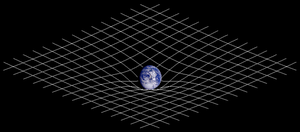Space is the negation of substance, of reality, of being; thus, space is nothing, unreality, non-being.
Can anyone see nothing or imagine nothing? Yes, for space is nothing. To see nothing means to see no thing.
Consequently, we do not see things in space; we see things alone and their negation, viz., space.
Things do not occupy space. For then, what does space occupy?
Things negate space, i.e. nothing.
Take a plastic bottle of 1 ltr. How much water can it contain? 1 ltr. Squeeze it, can it contain 1 ltr of water? No, why? Because the bottle being squeezed increasingly negates space allowing less negatability for another (meaning that negatibility for it increases at the same time). For perfect density = perfect negation of space; less density = less negation of space. That which is negated cannot be again negated without the destruction of that which negates it.
Zero = infinite; therefore, space = infinite; it can be infinitely negated by things without quantitative or qualitative alteration.
Theory of Relativity: the negatability increases where the positive thing increases (by energy increase, mass increases); thus, in higher speed space is more negated, giving rise to the phenomenon of shrunk space, which is nothing but more negated space.
Zeno’s Paradoxes: (1) On Density - Zero = infinite: on division remains same; 1 = finite in relation to multiplicity, infinite in relation to divisibility: on division does not remain same, yet never becomes zero. Zero is neither extensive nor intensive (there is no point where space meets space), while 1 is both extensive and intensive (made up of infinite points, for it takes infinite value to negate zero). Since 1 on infinite division, still never becomes zero, 1 is real. Thus, zero cannot be applied to 1.
(2) On Motion – (a) Achilles and Tortoise - The paradox only exists because it does not take the element of speed into account. (b) The Dichotomy – The distance between the runner and the finish line is infinitely divisible. Thus, it would take infinite time for the runner to complete the course. However, since the runner has an equal amount of infinite time (it is equally divisible as the distance) so the course can be completed.
© Domenic Marbaniang, June 2, 2006
See Also:Space as Non-Reality, Zeno's Arguments
Can anyone see nothing or imagine nothing? Yes, for space is nothing. To see nothing means to see no thing.
Consequently, we do not see things in space; we see things alone and their negation, viz., space.
Things do not occupy space. For then, what does space occupy?
Things negate space, i.e. nothing.
Take a plastic bottle of 1 ltr. How much water can it contain? 1 ltr. Squeeze it, can it contain 1 ltr of water? No, why? Because the bottle being squeezed increasingly negates space allowing less negatability for another (meaning that negatibility for it increases at the same time). For perfect density = perfect negation of space; less density = less negation of space. That which is negated cannot be again negated without the destruction of that which negates it.
Zero = infinite; therefore, space = infinite; it can be infinitely negated by things without quantitative or qualitative alteration.
Theory of Relativity: the negatability increases where the positive thing increases (by energy increase, mass increases); thus, in higher speed space is more negated, giving rise to the phenomenon of shrunk space, which is nothing but more negated space.
Zeno’s Paradoxes: (1) On Density - Zero = infinite: on division remains same; 1 = finite in relation to multiplicity, infinite in relation to divisibility: on division does not remain same, yet never becomes zero. Zero is neither extensive nor intensive (there is no point where space meets space), while 1 is both extensive and intensive (made up of infinite points, for it takes infinite value to negate zero). Since 1 on infinite division, still never becomes zero, 1 is real. Thus, zero cannot be applied to 1.
(2) On Motion – (a) Achilles and Tortoise - The paradox only exists because it does not take the element of speed into account. (b) The Dichotomy – The distance between the runner and the finish line is infinitely divisible. Thus, it would take infinite time for the runner to complete the course. However, since the runner has an equal amount of infinite time (it is equally divisible as the distance) so the course can be completed.
© Domenic Marbaniang, June 2, 2006
See Also:Space as Non-Reality, Zeno's Arguments

Comments
Post a Comment